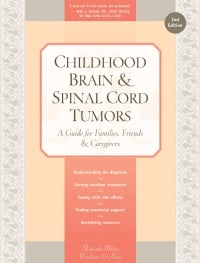Childhood Brain and Spinal Cord Tumors
Chapter 19: Sources of Support
The effort to “put up a front” is draining, isolating, and counterproductive. Support groups can be a powerful way of letting down these fronts a bit at a time among people who understand and feel the same conflicting pressure— to act as though everything is all right when it is not.
— David Spiegel, MD Living Beyond Limits
THE DIAGNOSIS OF CANCER CAN BE a frightening and isolating experience. Every parent of a child with cancer has a story to tell of lost or strained relationships. Yet we are social creatures, reliant on a web of support from family, friends, neighbors, and religious communities. We need the presence of people who not only care for us, but who sincerely try to understand what we are feeling. Many parents of children with cancer experience deep loneliness after the first rush of visits, cards, and phone calls ends—when the rest of the world goes back to normal life.
Members of families struck by childhood cancer—parents, the child with cancer, and siblings—often turn to support groups and various other forms of psychological and emotional help. Families join support groups to dispel isolation, share suggestions for dealing with the illness and its side effects, and talk to others who are living through the same crisis. Individual and family counseling can help address shifting responsibilities within the family, explore methods to improve communication, and help find ways to channel strong feelings constructively.
This chapter offers resources that can help families regain a sense of control over their lives and find wonderful new friends who understand what they are going through.
Table of Contents
All Guides- Introduction
- 1. Diagnosis
- 2. The Brain and Spinal Cord
- 3. Types of Tumors
- 4. Telling Your Child and Others
- 5. Choosing a Treatment
- 6. Coping with Procedures
- 7. Forming a Partnership with the Treatment Team
- 8. Hospitalization
- 9. Venous Catheters
- 10. Surgery
- 11. Chemotherapy
- 12. Common Side Effects of Chemotherapy
- 13. Radiation Therapy
- 14. Peripheral Blood Stem Cell Transplantation
- 15. Siblings
- 16. Family and Friends
- 17. Communication and Behavior
- 18. School
- 19. Sources of Support
- 20. Nutrition
- 21. Medical and Financial Record-keeping
- 22. End of Treatment and Beyond
- 23. Recurrence
- 24. Death and Bereavement
- 25. Looking Forward
- Appendix A. Blood Tests and What They Mean
- Appendix C. Books and Websites

